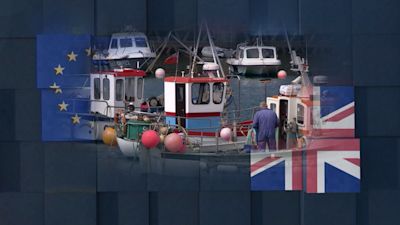Why are the French threatening to switch off the electricity in the Channel Islands?

Could a debacle over fishing rights really mean the electricity gets turned off in the Channel Islands?
It is fair to say that since the UK formally left the EU on 30 January 2020, the effects of Brexit have not been fully felt in the Channel Islands. But that is changing.
Things have never been plain sailing when it comes to fishing rights with France and Jersey. But since 1839 a treaty was in place to try and settle that conflict. The Granville Bay Treaty was the first international fishing agreement which allowed Jersey and French boats to fish in the Bay of Granville.
It also allowed the French to license their own boats to fish in Jersey's territorial waters. But it caused much contention.
Jersey's fleet of around 75 registered vessels is far less than the hundreds of French boats that sail in local waters. For Jersey's fishermen they believed the rules were too much in favour of the French. Protests took place last year calling for the government to better protect the island's waters and that led to a petition saying the treaty should be scrapped.
That happened when a Brexit deal was agreed by the UK government and the EU in December 2020, where they signed the Trade and Economic Co-operation agreement. Jersey provisionally became part of this deal in January 2021, which replaced the Granville Bay Treaty.
That meant that Jersey could manage its own waters, which was welcomed by many in the island. But friction between French and Channel Island fishermen continued to rumble on, with ongoing disputes around permits and paperwork following the Brexit deal.
Jersey fisherman believed they were being stopped from landing their catch in France, because some permits to fish in Jersey waters had not been granted.
But by the end of January 2021, a temporary "amnesty" arrangement had been made to allow for fishing.
That deal was not favoured by Jersey fishermen though, leading to a flotilla protest in March with them saying that a level playing field had still not been achieved.
The amnesty lasted until 30 April, where French fisherman with a history of activity in the island's waters could continue to fish as outlined in the Granville Bay agreement.
But when that amnesty ended on 1 May, Jersey began to issue the first permanent fishing licenses to French vessels under the new licensing scheme.
But these licenses have angered the French. Officials there say there are more restrictions placed on them than was ever agreed with Jersey's External Relation's Minister, Senator Ian Gorst.
That has led us to where we are now with France's Maritime Minister backing fishermen's calls to cut off Jersey's electricity supply in retaliation.
Annick Girardin told the parliament in Paris on 4 May that her administration was "ready to use... retaliation measures" against the Channel Islands.
So where does that leave us? Jersey imports more than 90% of its power from France. And that will have a knock on effect for Guernsey too which gets its electricity through Jersey.
In light of the situation, Jersey Electricity says the island can rely on La Collette Power Station and Queens’ Road station for power.
Guernsey Electricity also says it will be able to provide power in the event that it is cut from France.
So it seems for now islanders can be reassured that the lights will stay on in the Channel Islands. But resorting to Guernsey and Jersey's power stations could mean higher electricity prices, which no one will want of course.
What is clear though, is after a year of concentrating on a pandemic, islanders are now having to contend with the effects of Brexit with their closest neighbour.